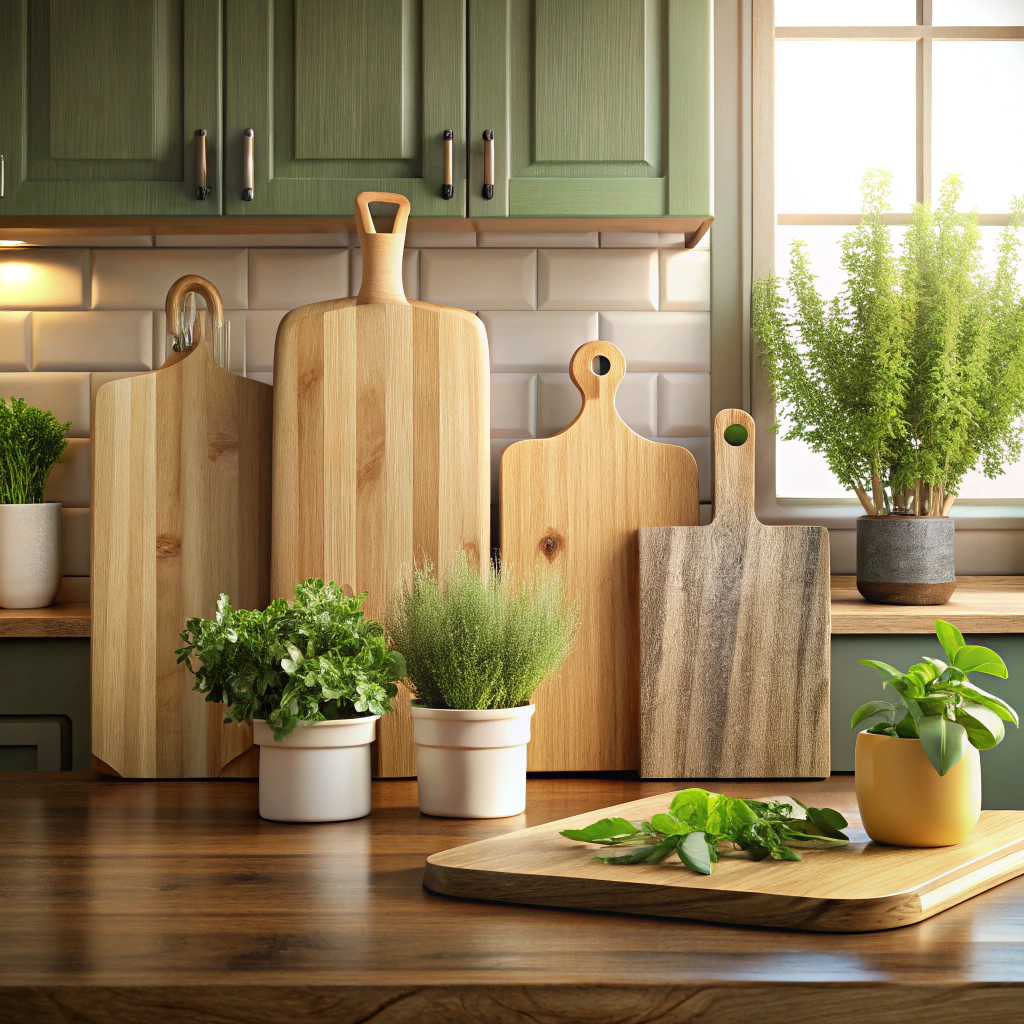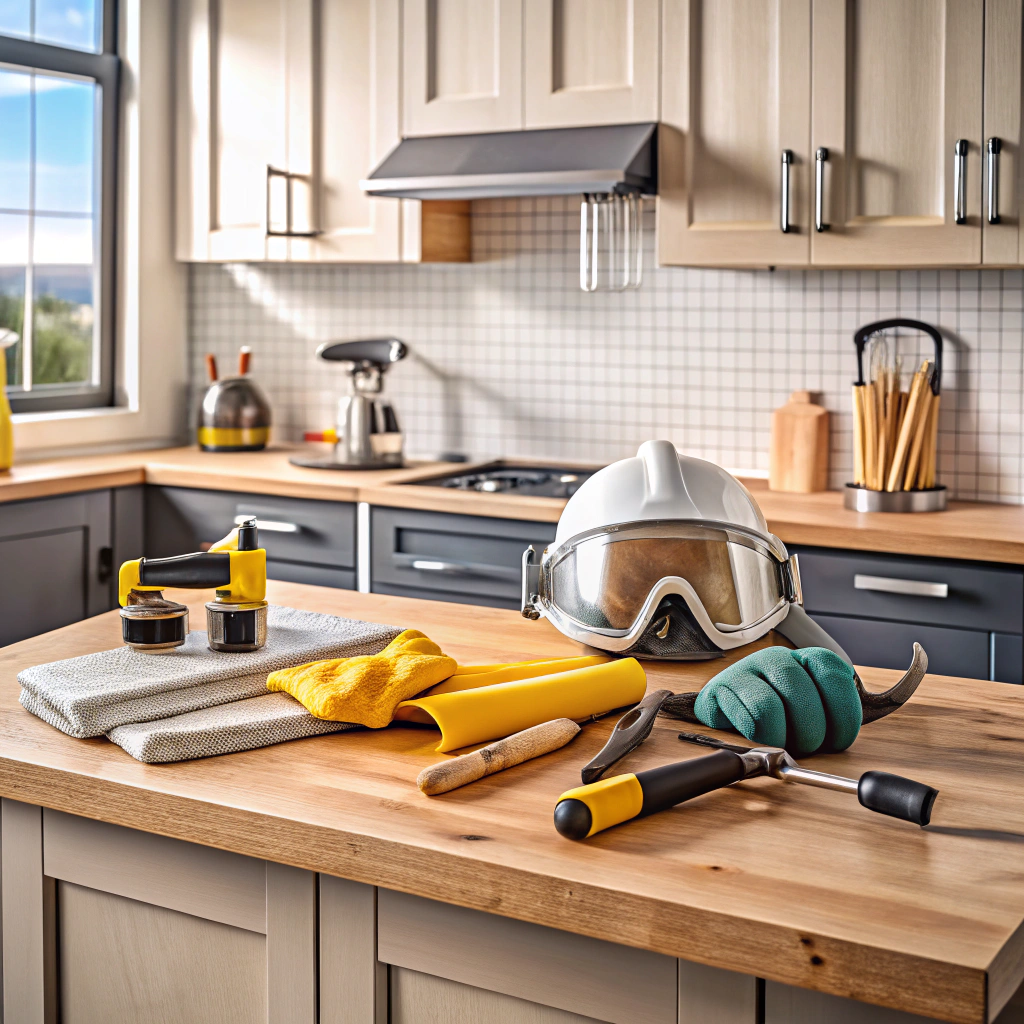Last updated on
Discover the various factors that influence the cost of redoing your kitchen floor, and learn how to make an informed decision for a stunning transformation.
Updating your kitchen floor is a great way to give your space a fresh new look. Whether you’re looking to replace outdated tiles or install hardwood floors, renovating your kitchen floor can add value to your home and make cooking and entertaining more enjoyable.
But before you get started, it’s important to consider the cost of such a project. In this article, we’ll break down the expenses involved in redoing a kitchen floor so that you can make an informed decision about how much to budget for this exciting home improvement task.
What's Inside
Types of Flooring Materials
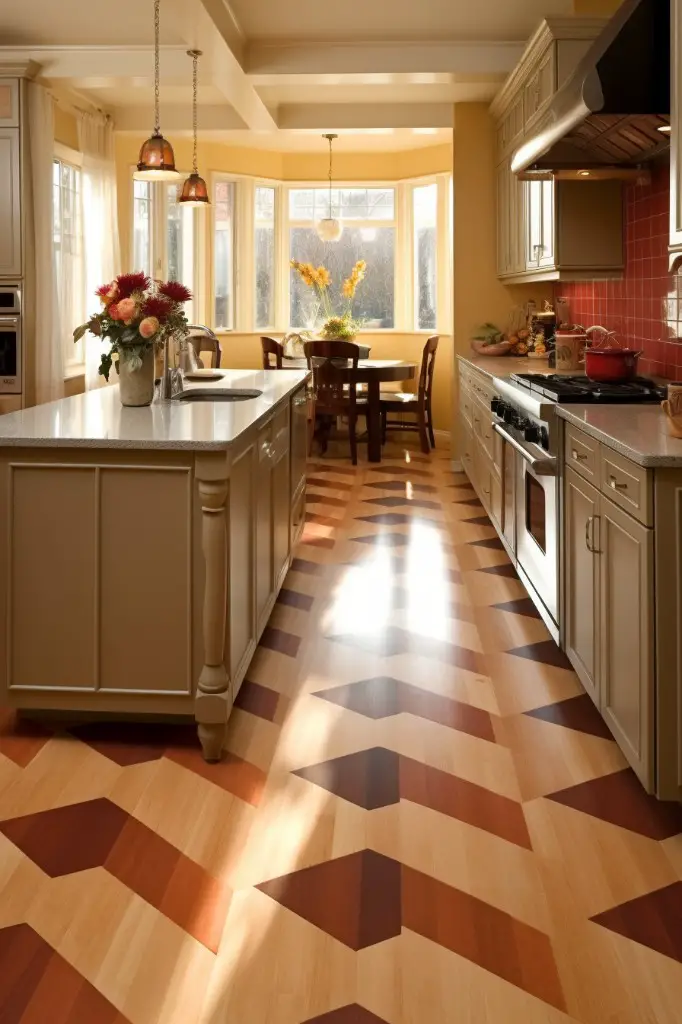
Each material has its own unique characteristics and price point, so it’s important to consider which option will work best for your budget and lifestyle. Some popular options include hardwood flooring, laminate flooring, tile flooring, vinyl flooring, cork flooring, bamboo flooring concrete floors and stone floors.
Hardwood is a classic choice that adds warmth and elegance to any space but can be expensive. Laminate is an affordable alternative that mimics the look of hardwood without the high cost or maintenance requirements.
Tile offers durability in high-traffic areas like kitchens but can be cold underfoot during winter months.
Vinyl is another durable option with a wide range of styles available at different price points while cork provides cushioning underfoot making it comfortable for long periods standing in the kitchen.
Bamboo offers eco-friendly benefits as well as being durable while concrete provides an industrial aesthetic perfect for modern kitchens. Stone floors offer natural beauty with varying degrees of hardness depending on type used such as granite or marble.
Cost of Hardwood Flooring
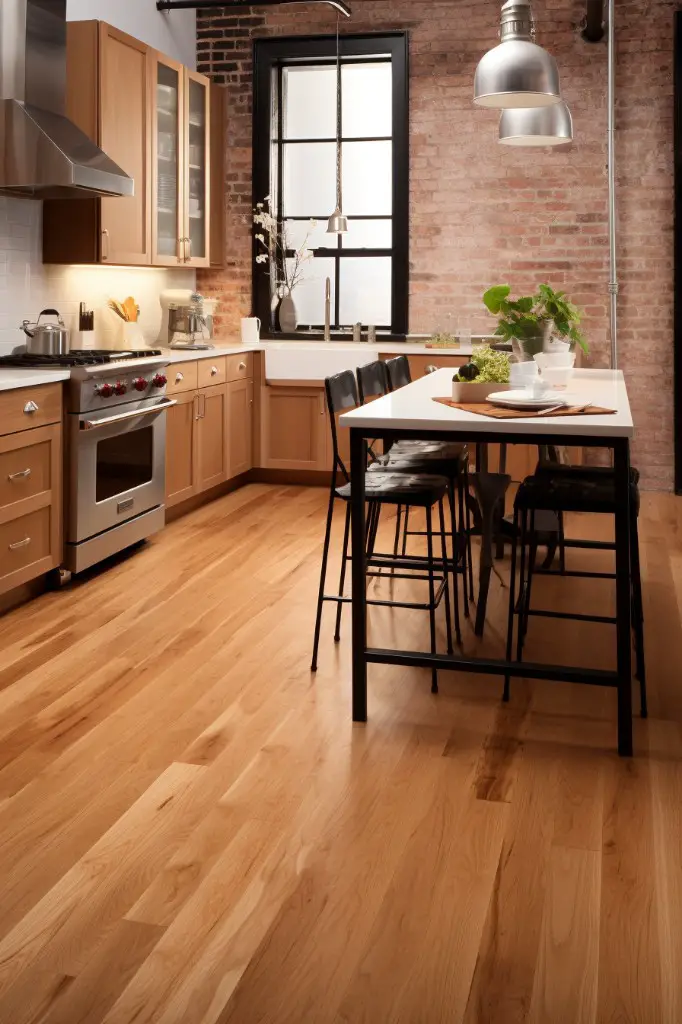
It can also be one of the most expensive options. The cost of hardwood flooring varies depending on several factors such as the type of wood, thickness, finish, and installation method.
On average, homeowners can expect to pay between $8-$14 per square foot for materials alone. This means that if you have a 200-square-foot kitchen floor space that needs new hardwood floors installed professionally with no additional expenses or complications involved in the process; you should budget around $1,600 – $2,800 just for materials.
Keep in mind that labor costs are not included in this estimate and will vary depending on your location and contractor rates. If your subfloor requires repair or leveling before installation or removal of old flooring material is necessary beforehand; these extra steps will add more expense to your project’s overall cost.
Cost of Laminate Flooring
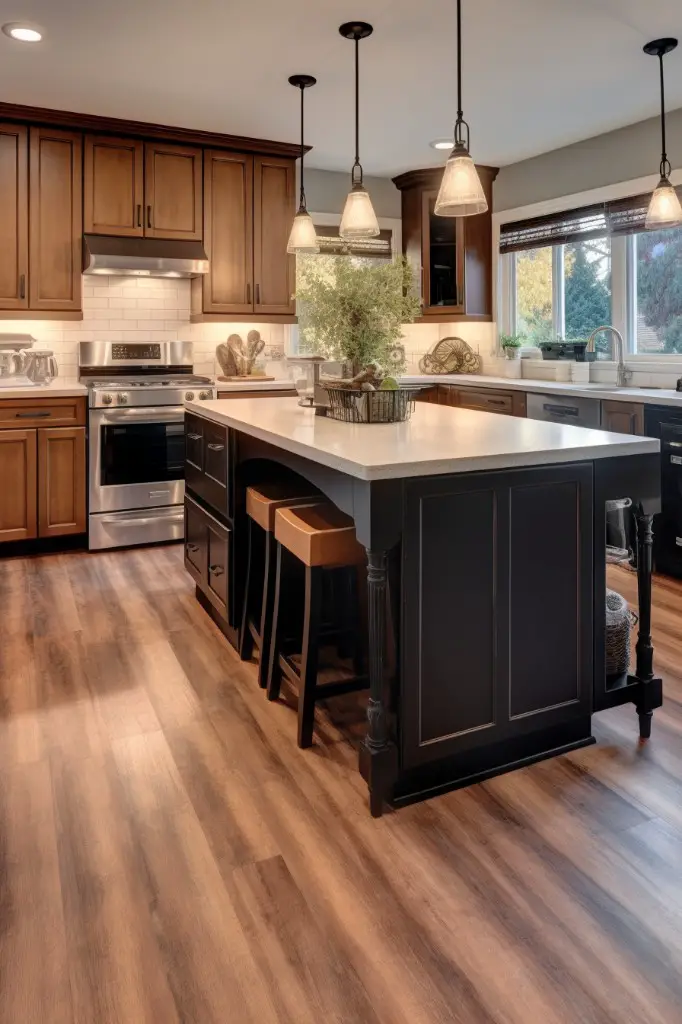
The cost of laminate flooring varies depending on the quality and thickness of the material. On average, homeowners can expect to pay between $2-$8 per square foot for materials alone.
In addition to material costs, labor expenses should also be factored in when budgeting for laminate floor installation. Professional installation typically costs around $3-$7 per square foot but may vary based on location and complexity of the project.
It’s important to note that while laminate flooring is an affordable option compared to other types of kitchen floors such as hardwood or stone tiles, it may not last as long or add as much value if you plan on selling your home in the future.
Cost of Tile Flooring
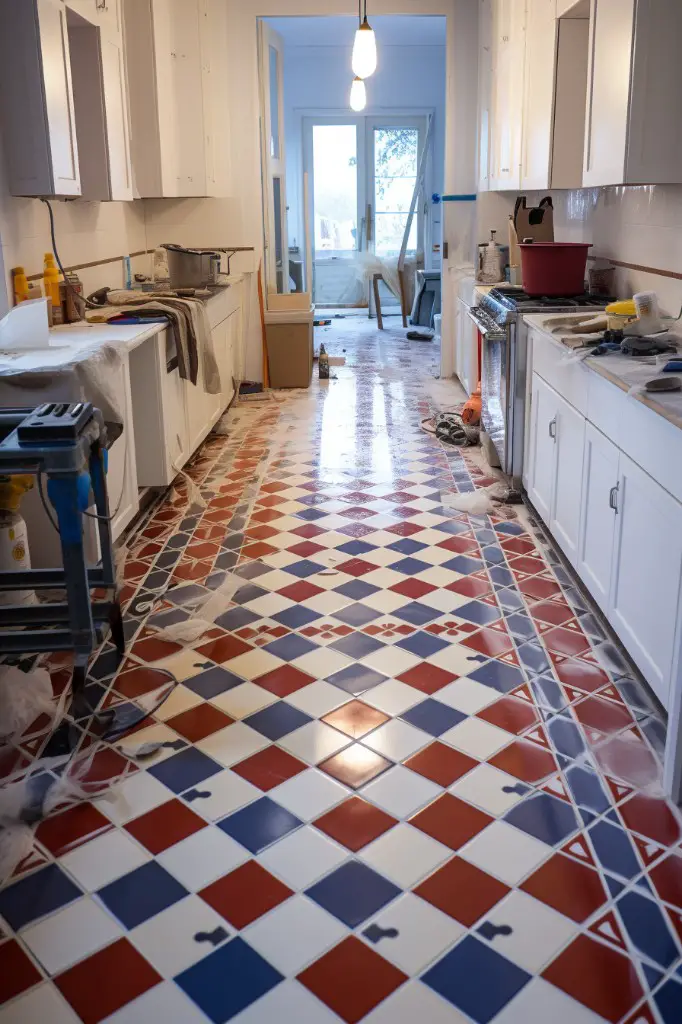
The cost of tile flooring can vary depending on the type of tile you choose, as well as the size and complexity of your kitchen floor. Ceramic tiles are one of the most affordable options, with prices ranging from $1 to $15 per square foot.
Porcelain tiles are more expensive but offer greater durability and resistance to moisture damage, with prices ranging from $3 to $20 per square foot.
Natural stone tiles such as granite or marble can be quite costly at around $10-$30 per square foot but add an elegant touch that’s hard to match by other materials. Keep in mind that installation costs will also factor into your overall expenses when it comes time for installation.
Cost of Vinyl Flooring
The cost of vinyl flooring can vary depending on the quality and thickness of the material. On average, you can expect to pay between $2-$5 per square foot for vinyl plank or sheet flooring.
The price range may increase if you opt for luxury vinyl tiles (LVT) or planks that mimic natural materials like hardwood or stone. LVTs are thicker than standard vinyl sheets and come with advanced features such as scratch-resistant coatings.
When budgeting for your kitchen floor renovation project, keep in mind that additional expenses such as underlayment installation costs may apply when installing new floors over an existing subfloor. It’s also important to factor in labor costs if you plan on hiring professionals instead of doing it yourself.
Cost of Cork Flooring
Cork is harvested from the bark of cork oak trees, which means that it’s a renewable resource. The cost of cork flooring varies depending on the quality and thickness of the material, as well as installation costs.
On average, you can expect to pay between $3 to $8 per square foot for materials alone. However, keep in mind that this price range may vary based on your location and supplier availability.
Installation costs will also add up to your total expenses when redoing your kitchen floor with cork tiles or planks. If you’re planning on hiring professionals for installation services, expect labor fees ranging from $2-$4 per square foot.
Cost of Bamboo Flooring
It’s also durable, easy to maintain, and has a unique look that can add character to your kitchen. The cost of bamboo flooring varies depending on the quality of the material you choose.
On average, expect to pay between $2-$8 per square foot for materials alone.
The installation costs will depend on whether you opt for professional or DIY installation. If you’re handy with tools and have experience installing floors, then doing it yourself can save money in labor costs which typically range from $3-$7 per square foot.
However, if this is your first time installing bamboo floors or any type of floor covering at all; hiring professionals may be worth considering as they have the necessary skills and equipment needed to ensure proper installation.
Cost of Concrete Flooring
It can be stained, polished, or stamped to create unique designs that complement any kitchen decor. The cost of concrete flooring varies depending on the size of your kitchen and the complexity of the design you choose.
On average, homeowners can expect to pay between $2 and $15 per square foot for basic concrete floors. However, if you opt for more intricate designs such as acid staining or engraving patterns into the surface, costs can increase up to $30 per square foot.
It’s important to note that while concrete floors are durable and long-lasting once installed correctly by professionals; they require regular maintenance like waxing every six months or so which adds an additional expense over time.
Cost of Stone Flooring
It’s also one of the most expensive options available. The cost of stone flooring can vary depending on the type of stone you choose, as well as its quality and thickness.
Marble is one of the most luxurious types of natural stone used in kitchen floors. It has an average cost per square foot ranging from $10-$20 or more, making it one of the priciest options out there.
Granite is another popular option that offers durability and beauty at a slightly lower price point than marble. Its average cost per square foot ranges from $5-$15 or more.
Slate is known for its unique texture and color variations which make each tile look different from others; however, this comes with an increased price tag compared to other stones like granite or limestone with costs ranging between $6-$12 per square foot on average.
Limestone has become increasingly popular due to its warm tones but can be prone to scratches if not sealed properly during installation; expect prices around $7-10/sqft.
Popular Kitchen Flooring Options
Hardwood floors are a classic choice that can add warmth and elegance to any kitchen. Laminate flooring is another affordable option that mimics the look of hardwood without the high price tag.
Tile flooring is also a popular choice due to its durability and versatility in design options.
Vinyl flooring has come a long way in recent years with advancements in technology allowing for more realistic wood or stone looks at an affordable price point. Cork and bamboo floors offer eco-friendly alternatives while concrete and stone provide unique textures for modern kitchens.
Each type of material has its own pros and cons, so it’s important to consider your lifestyle needs when choosing which one will work best for you. For example, if you have young children or pets who may cause spills or scratches on your floor, tile or vinyl might be better suited than hardwoods.
Cost Per Square Foot Comparison
This metric can help you compare different flooring materials and determine which option fits within your budget. Hardwood floors are a popular choice for kitchens, but they can be expensive at around $8-$14 per square foot installed.
Laminate flooring is a more affordable alternative that costs between $2-$8 per square foot installed.
Tile flooring is another common option for kitchens and ranges in price from $1-$20 or more per square foot depending on the type of tile chosen. Vinyl flooring offers an even lower cost option at around $0.50 – $5 per square foot installed while still providing durability and water resistance.
Cork, bamboo, concrete, and stone are other options with varying costs ranging from mid-range to high-end prices depending on their quality level.
It’s essential to keep in mind that these prices may vary based on location as well as additional expenses such as labor costs or removal fees if replacing old floors before installation.
Labor Costs
The cost of labor can vary depending on the type of flooring material you choose, the size and complexity of your kitchen, and whether you opt for professional installation or decide to tackle the project yourself.
If you’re planning on hiring a professional contractor to install your new floors, expect to pay an average hourly rate between $50-$100 per hour. This rate may increase if additional work is required such as removing old flooring or repairing subfloor damage.
On the other hand, if you decide to take on this project yourself without any prior experience in installing floors, it’s important that you factor in extra time and potential mistakes that could end up costing more money down the line. Keep in mind that some types of flooring materials require specialized tools or techniques which may be difficult for beginners.
Labor costs should be taken into account when creating a budget plan for redoing your kitchen floor.
Factors Affecting Kitchen Flooring Prices
The type of flooring material you choose is one of the most significant factors that will impact your budget. Hardwood floors, for example, tend to be more expensive than vinyl or laminate options.
Labor costs can vary depending on where you live and whether you hire a professional contractor or do it yourself.
Other important considerations include the size and shape of your kitchen space as well as any additional expenses such as removing old flooring materials or repairing subfloor damage before installing new floors.
The quality and durability of different types of flooring materials also play a role in determining their price points. For instance, natural stone tiles are typically more expensive than ceramic tiles due to their unique beauty and longevity.
DIY Vs. Professional Installation
While DIY installation can save you money on labor costs, it’s important to consider your skill level and the complexity of the job before taking on such a task. Installing flooring requires precision and attention to detail, so if you’re not confident in your abilities or lack experience with this type of work, hiring a professional is likely worth the investment.
Professional installers have years of experience working with different types of flooring materials and can ensure that everything is installed correctly for optimal durability and longevity. They also have access to specialized tools that make installation faster and more efficient than doing it yourself.
However, if you do decide to go down the DIY route for installing new kitchen floors, there are plenty of resources available online that provide step-by-step instructions for various types of flooring materials. Just be sure to take accurate measurements beforehand so that you purchase enough material without overspending.
Additional Expenses
For example, if you’re installing hardwood floors, you may need to purchase additional subflooring or underlayment materials. You may also need to pay for removal and disposal of your old flooring material.
Another expense that many homeowners overlook is the cost of baseboards or trim pieces. If you’re replacing your kitchen floor with a different type of material than what was previously installed, it’s likely that some areas will require new baseboards or trim pieces to cover gaps between the wall and flooring.
Don’t forget about any necessary repairs before installation can begin. This could include fixing cracks in concrete subfloors or repairing damaged sections of wood subfloors.
Budgeting Tips for Redoing Kitchen Floors
It’s important to have a clear idea of how much you can afford to spend before you start shopping for flooring materials and hiring contractors. Here are some tips on how to budget effectively for your kitchen floor renovation:
1. Determine the scope of the project: Decide whether you want to replace just the flooring or if there are other aspects of your kitchen that need updating as well.
2. Research different types of flooring materials: Look into various options and compare prices per square foot, installation costs, durability, maintenance requirements and warranties.
3. Get multiple quotes from contractors: Shop around for reputable professionals who offer competitive pricing while still providing quality workmanship.
4. Consider DIY options: If you’re handy with tools and have experience in home improvement projects, consider doing some or all of the work yourself instead of hiring a contractor.
5. Factor in additional expenses such as removal/disposal fees (if applicable), underlayment material costs (for certain types like hardwood) or any necessary repairs prior to installing new floors.
Choosing the Right Flooring Material
First and foremost, you’ll want a durable option that can withstand heavy foot traffic and spills. You’ll also want something that complements your kitchen’s overall design aesthetic.
Hardwood floors are a popular choice for their timeless appeal and durability, but they can be expensive. Laminate flooring is an affordable alternative that mimics the look of hardwood without breaking the bank.
Tile is another durable option with endless design possibilities.
Vinyl flooring has come a long way in recent years and offers both affordability and versatility in terms of style options. Cork floors provide cushioning underfoot while being eco-friendly as well as water-resistant.
Bamboo floors offer sustainability along with durability but may not be suitable if you have pets or young children who could scratch them easily. Concrete provides an industrial-chic look while stone adds natural beauty to any space.
Warranty and Maintenance Considerations
Some flooring materials require more upkeep than others, which can add to the overall expense over time. For example, hardwood floors may need refinishing every few years to maintain their appearance and durability.
On the other hand, vinyl or tile floors are relatively low-maintenance options that can withstand heavy foot traffic without requiring much attention.
Another aspect to consider is warranties offered by manufacturers or installers. Be sure to read through any warranty information carefully before making a decision on which flooring material you choose for your kitchen renovation project.
Warranties typically cover defects in materials or workmanship but may not include damage caused by improper installation or neglectful maintenance.
Some types of flooring come with specific care instructions that must be followed in order for them to remain under warranty coverage. For instance, certain cleaning products could void a manufacturer’s warranty if used on particular types of flooring surfaces.
Eco-friendly Flooring Options
If you’re looking for an eco-friendly kitchen floor, there are several sustainable materials to choose from. Cork is one of the most environmentally friendly options as it’s made from renewable resources and can be harvested without harming the tree.
Bamboo is another great choice as it grows quickly, making it a highly renewable resource that’s also durable and water-resistant.
Another option for eco-conscious homeowners is reclaimed wood flooring which involves using salvaged wood from old buildings or structures instead of cutting down new trees. This not only reduces waste but also adds character to your kitchen with its unique history.
If you’re interested in more modern-looking floors, consider recycled glass tiles or concrete floors made with recycled materials such as fly ash or slag cement.
When choosing an eco-friendly flooring material, make sure to look for certifications such as Forest Stewardship Council (FSC) certification which ensures that the product comes from responsibly managed forests or Cradle-to-Cradle certification which evaluates products based on their environmental impact throughout their lifecycle.
While some eco-friendly options may have higher upfront costs than traditional materials, they often pay off in long-term savings through energy efficiency and durability while contributing positively towards our planet’s health!
FAQ
Can you change flooring without removing kitchen?
Yes, you can change flooring without removing the kitchen by carefully cutting the flooring with a tile saw to align with the cabinet base, saving time and money.
How much does it cost to install 1000 square feet of tile floors?
The cost to install 1000 square feet of tile floors ranges from $13,500 to $63,000 for ceramic or porcelain indoors, and $14,000 to $83,000 for outdoors.
Is it cheaper to hardwood or tile?
Tile is significantly cheaper than hardwood in most cases, making it a more cost-effective option for flooring.
What are the most budget-friendly options for updating kitchen flooring?
The most budget-friendly options for updating kitchen flooring include vinyl, laminate, and ceramic tiles.
How do the costs of different flooring materials compare for kitchen renovations?
Costs for kitchen flooring materials vary, with hardwood typically being more expensive than laminate and ceramic tiles, and natural stone coming at a higher price than other options.
Does replacing kitchen flooring increase the overall value of a home?
Yes, replacing kitchen flooring can increase the overall value of a home.


